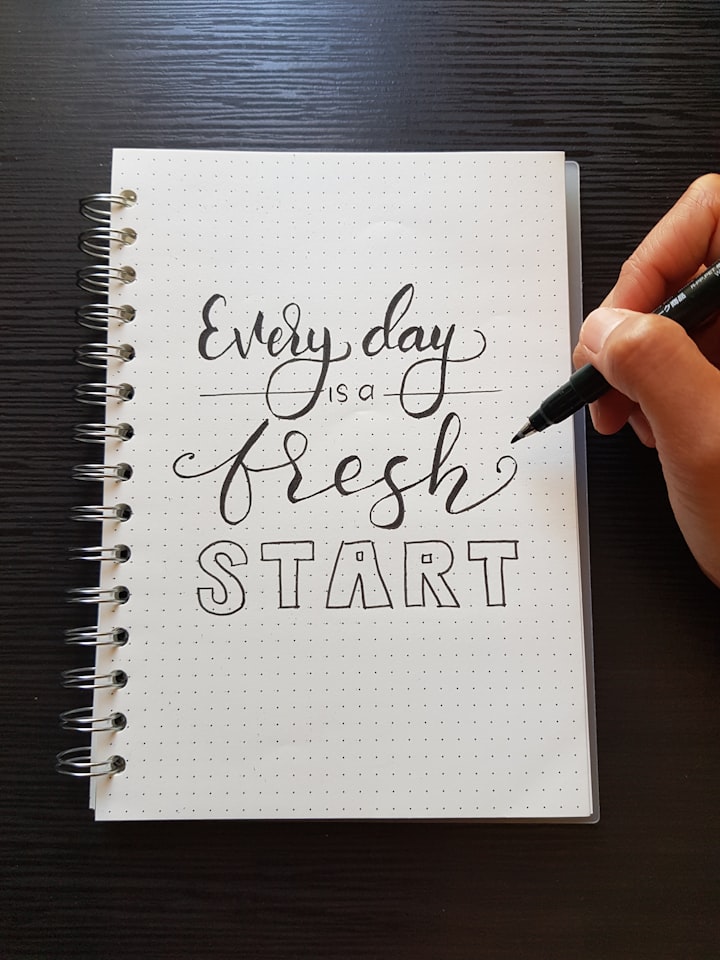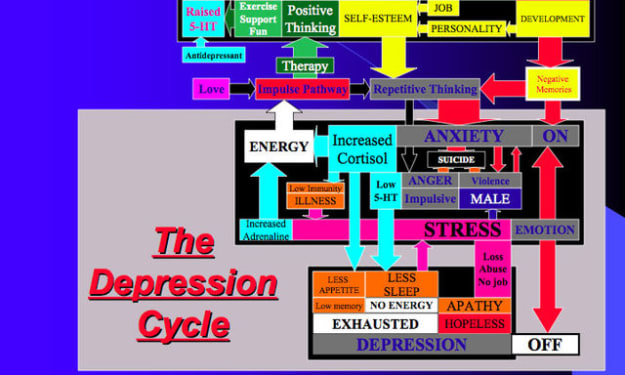A World Without Existence.
A Description of How It Feels To Live Without A Voice In The World Of Mental Health.

Imagine a world with nothing.
No birds singing, no kids playing, no food, no water, no adults, no work;
Just nothing.
There can't be life without existence.
Imagine if you could think but didn't exist.
Who would you be, if you were invisible?
They say to be able to think, you must exist, but that doesn't feel like it is true for all of us.
For some of us with mental health problems it feels like life isn't there at all.
It's a lonely place to be.
I remember the hardest days of dealing with my own mental health problems.
- People found it hard to understand me.
- People thought I was dangerous.
- People always misunderstood me.
.... And they avoided me like the plague and spoke about me like I wasn't there.
It wasn't a nice feeling. It felt like I was alive but dead in some way.
I remember when my problems were really bad.
I'd cry, shake, get mad, be terrified, and I'd often stammer when I spoke. I'd also check the doors in my house over and over, just to make sure that I was safe.
And people wouldn't come near me, though they would talk about me behind my back as though I was a toy.
my only existence to them was an inanimate object that they could mock because in their eyes,
I was "crazy."
Nobody thought to ask me what was wrong or talk about what happened to me. If they had, they would have realized that I was traumatized,
or would they?
That word 'trauma' seemed to give everyone an automatic right to pick on me, and make me more vulnerable.
Those who I finally opened up to, bullied me for a number of years afterward, including some professionals who decided that my vulnerability gave them the right to say anything they wanted about me,
And because I had been diagnosed with a mental health problem, everybody believed them. Not one of them listened when I tried talking about what had happened.
The only way to help someone with a mental health problem is to:
Talk without judging
Don't dismiss their truth based on your own perceptions, even as a professional. You haven't seen what happened to them with your own eyes, and you can't feel what they are feeling
- Validate the sufferer's feelings.
- Treat them as they are: human.
- Don't sneer and laugh, or talk behind their backs.
- See the person behind the mental health problems.
- Show that you care.
- Let them speak and listen.
- Make sure that they feel included.
I have spoken to many people who cope with mental health problems in the U.K. on a regular basis, some of them are close friends and many of them have told me,
People talk about changing the stigma. They say 'it is okay to not be okay,' but they still feel like they don't exist because when they talk, they are still judged in society.
This is not good.
I spent many years campaigning as a mental health champion to change this, and while we are being more open about mental health, I feel we still need to push for the rights of people with mental health problems to be heard and properly seen.
People with mental health problems want to be treated like human beings and not like the guinea pigs of society.
They want to be:
Seen
Heaproblems.
People found it hard to understand me.
People thought I was dangerous.
People always misunderstood me.
.... And they avoided me like the plague and spoke about me like I wasn't there.
It wasn't a nice feeling. It felt like I was alive but dead in some way.
I remember when my problems were really bad.
I'd cry, shake, get mad, be terrified, and I'd often stammer when I spoke. I'd also check the doors in my house over and over, just to make sure that I was safe.
And people wouldn't come near me, though they would talk about me behind my back as though I was a toy.
my only existence to them was an inanimate object that they could mock because in their eyes,
I was "crazy."
Nobody thought to ask me what was wrong or talk about what happened to me. If they had, they would have realized that I was traumatized,
or would they?
That word 'trauma' seemed to give everyone an automatic right to pick on me, and make me more vulnerable.
Those who I finally opened up to, bullied me for a number of years afterward, including some professionals who decided that my vulnerability gave them the right to say anything they wanted about me,
And because I had been diagnosed with a mental health problem, everybody believed them. Not one of them listened when I tried talking about what had happened.
The only way to help someone with a mental health problem is to:
Talk without judging
Don't dismiss their truth based on your own perceptions, even as a professional. You haven't seen what happened to them with your own eyes, and you can't feel what they are feeling
Validate the sufferer's feelings.
Treat them as they are: human.
Don't sneer and laugh, or talk behind their backs.
See the person behind the mental health problems.
Show that you care.
Let them speak and listen.
Make sure that they feel included.
I have spoken to many people who cope with mental health problems in the U.K. on a regular basis, some of them are close friends and many of them have told me,
People talk about changing the stigma. They say 'it is okay to not be okay,' but they still feel like they don't exist because when they talk, they are still judged in society.
This is not good.
I spent many years campaigning as a mental health champion to change this, and while we are being more open about mental health, I feel we still need to push for the rights of people with mental health problems to be heard and properly seen.
People with mental health problems want to be treated like human beings and not like the guinea pigs of society.
They want to be:
- Seen
- Heard
- Accepted
- Helped
- Allowed to feel
- Respected
- And treated like human beings.
It's not too much to ask.
Remember; we are all human, and we all count.
About the Creator
Carol Townend
Fiction, Horror, Sex, Love, Mental Health, Children's fiction and more. You'll find many stories in my profile. I don't believe in sticking with one Niche! I write, but I also read a lot too.
Enjoyed the story? Support the Creator.
Subscribe for free to receive all their stories in your feed. You could also pledge your support or give them a one-off tip, letting them know you appreciate their work.






Comments
There are no comments for this story
Be the first to respond and start the conversation.